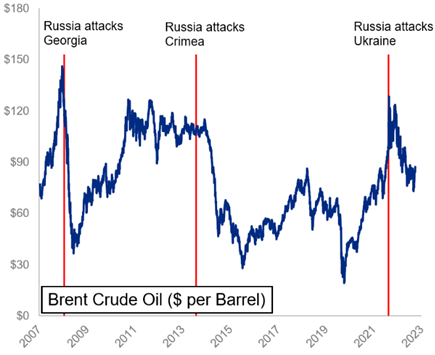
Energy Policy as a Key Component of National Security - Washington Policy Research
When Russia invaded Ukraine, Europe realized the danger of being dependent on Russia for its energy supplies and has since moved towards other energy sources and adoption of more renewable energy. Similarly, as the world deglobalizes, US policymakers see the need to ensure US energy security and are looking to adopt domestic energy policy that can provide a counterweight to shifting geopolitical dynamics.
At the end of March, House Republicans passed their top legislative priority, the Lower Energy Costs Act, which seeks to increase oil and gas production and exports, improve permitting for energy distribution, and enable mining of critical minerals. While the bill, as written, will not pass the Senate, its passage is important for two major reasons. First, Republicans are likely to push for some of the permitting ideas as part of negotiations to lift the debt ceiling. Second, a number of the bill’s proposals demonstrate how the US will focus on its energy security needs longer term, which will include both fossil fuel and clean energy production, as well as the ability to export energy to counteract the influence of other actors.
Energy permitting to be part of the debt ceiling negotiations. House Republicans are calling for spending cuts in exchange for raising the debt ceiling later this summer, to which Democrats are opposed. In order to find a compromise, other policy measures can be included. Energy permitting reform is a viable option for this, as it can support the development of both fossil fuel energy and renewable energy.
 Longer term, the US wants to provide a counterweight on energy. High oil prices create geopolitical instability. In fact, the last three Russian invasions occurred when crude prices hit $100 per barrel (see right). OPEC+ cut production at its last two meetings, which is seen as a way to prop up a Russian economy struggling under Western sanctions. And while the US used to be dependent on the Persian Gulf for oil, China is now the region’s largest customer, which is leading to an alliance between Saudi Arabia and China. This alliance is also seen as a threat to the “petrodollar” trade, which helps support the US as the world reserve currency. The US and Saudi Arabia have had a long-standing partnership in which the US has provided security and Saudi Arabia has conducted oil trades in US dollars. While China would like to dethrone the US dollar as the world reserve currency, a key reason the US dollar has maintained that status is the stability and the strength of the US economy. It’s hard to see an alternative currency emerging that would have those same characteristics in the near term, but we do generally see a diversification away from the dollar beginning to occur.
Longer term, the US wants to provide a counterweight on energy. High oil prices create geopolitical instability. In fact, the last three Russian invasions occurred when crude prices hit $100 per barrel (see right). OPEC+ cut production at its last two meetings, which is seen as a way to prop up a Russian economy struggling under Western sanctions. And while the US used to be dependent on the Persian Gulf for oil, China is now the region’s largest customer, which is leading to an alliance between Saudi Arabia and China. This alliance is also seen as a threat to the “petrodollar” trade, which helps support the US as the world reserve currency. The US and Saudi Arabia have had a long-standing partnership in which the US has provided security and Saudi Arabia has conducted oil trades in US dollars. While China would like to dethrone the US dollar as the world reserve currency, a key reason the US dollar has maintained that status is the stability and the strength of the US economy. It’s hard to see an alternative currency emerging that would have those same characteristics in the near term, but we do generally see a diversification away from the dollar beginning to occur.
US policymakers see energy policy as a means to counteract these dynamics. Lower oil prices can restrain Putin’s adventurism. US energy security prevents US dependency on other countries, and US energy exports can prevent US allies from being dependent on Russia or OPEC+ members. This will be a longer term policy priority, but a first step can be achieved by attaching permitting to the debt ceiling.
Disclosures
This is not a complete analysis of every material fact regarding any company, industry or security. The opinions expressed here reflect our judgment at this date and are subject to change. The information has been obtained from sources we consider to be reliable, but we cannot guarantee the accuracy.
This report does not provide recipients with information or advice that is sufficient to base an investment decision on. This report does not take into account the specific investment objectives, financial situation, or need of any particular client and may not be suitable for all types of investors. Recipients should consider the contents of this report as a single factor in making an investment decision. Additional fundamental and other analyses would be required to make an investment decision about any individual security identified in this report.
For investment advice specific to your situation, or for additional information, please contact your Baird Financial Advisor and/or your tax or legal advisor.
Fixed income yield and equity multiples do not correlate and while they can be used as a general comparison, the investments carry material differences in how they are structured and how they are valued. Both carry unique risks that the other may not.
Past performance is not indicative of future results and diversification does not ensure a profit or protect against loss. All investments carry some level of risk, including loss of principal. An investment cannot be made directly in an index.
Strategas Asset Management, LLC and Strategas Securities, LLC are affiliated with and wholly owned by Robert W. Baird & Co. Incorporated, a broker-dealer and FINRA member firm, although the firms conduct separate and distinct businesses.
Copyright 2023 Robert W. Baird & Co. Incorporated.
Other Disclosures
UK disclosure requirements for the purpose of distributing this research into the UK and other countries for which Robert W. Baird Limited holds an ISD passport.
This report is for distribution into the United Kingdom only to persons who fall within Article 19 or Article 49(2) of the Financial Services and Markets Act 2000 (financial promotion) order 2001 being persons who are investment professionals and may not be distributed to private clients. Issued in the United Kingdom by Robert W. Baird Limited, which has an office at Finsbury Circus House, 15 Finsbury Circus, London EC2M 7EB, and is a company authorized and regulated by the Financial Conduct Authority. For the purposes of the Financial Conduct Authority requirements, this investment research report is classified as objective.
Robert W. Baird Limited ("RWBL") is exempt from the requirement to hold an Australian financial services license. RWBL is regulated by the Financial Conduct Authority ("FCA") under UK laws and those laws may differ from Australian laws. This document has been prepared in accordance with FCA requirements and not Australian laws.